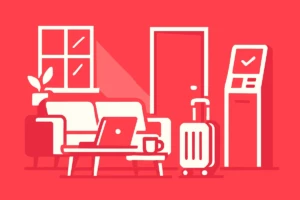|
Getting your Trinity Audio player ready...
|
The serviced apartments business is booming, with global revenues projected to surpass $132 billion by 2025. Entrepreneurs and property managers are tapping into this surge, drawn by high occupancy rates and flexible rental models.
This guide gives you everything needed to launch, operate, and scale your own serviced apartments business. Explore market trends, proven business models, setup steps, operational strategies, legal essentials, marketing tactics, and future opportunities.
Ready to turn opportunity into profit? Dive in for actionable insights and expert strategies that will set your serviced apartments business up for lasting success.
Understanding the Serviced Apartments Business Model
The serviced apartments business is rapidly transforming the hospitality landscape, blending the comfort of home with the perks of a hotel. Understanding this model is essential for anyone looking to enter or grow in this dynamic sector.

Definition and Core Features of Serviced Apartments
What sets the serviced apartments business apart from hotels and traditional rentals? The answer lies in a unique blend of features. Serviced apartments offer fully equipped kitchens, spacious living areas, in-unit laundry, and housekeeping services. Utilities are typically included, and guests enjoy flexible lease terms—ranging from nightly to monthly stays.
These properties cater to diverse markets such as business travelers, project teams, relocating professionals, and families. The serviced apartments business thrives by delivering privacy and home-like comfort with the convenience of hospitality services.
Business Models: Ownership, Leasing, and Management
A key decision in the serviced apartments business is choosing the right operating model. There are three main approaches:
- Direct Ownership: Buying and operating the property, offering full control but higher capital requirements.
- Lease Arbitrage: Leasing properties long-term and renting them out short-term, which lowers upfront costs but increases lease risk.
- Management Contracts: Managing serviced apartments on behalf of owners for a fee or revenue share, minimizing risk and capital investment.
Each model offers different levels of scalability and risk, so selecting the right fit is crucial for long-term growth in the serviced apartments business.
Revenue Streams and Profitability
Profitability in the serviced apartments business comes from multiple revenue streams. Operators can charge nightly or monthly rates, often commanding higher returns than traditional rentals. Additional services—such as laundry, airport transfers, parking, or concierge—boost revenue further.
Industry benchmarks indicate occupancy rates of 70-85% in top markets as of 2024. The combination of high occupancy and diversified income streams makes the serviced apartments business an attractive investment.
| Revenue Stream | Typical Contribution | Example Services |
|---|---|---|
| Accommodation | 70-90% | Nightly/Monthly Rent |
| Ancillary Services | 10-30% | Laundry, Transfers |
Market Demand and Growth Projections for 2025
The global serviced apartments business is on a steep upward trajectory. According to Serviced Apartment Market Trends, Share and Forecast, 2025-2032, the market is projected to exceed $132 billion by 2025. This surge is fueled by the rebound in business travel, remote work flexibility, and a growing preference for extended stays.
Urbanization and flexible living trends further accelerate demand, making 2025 a pivotal year for expansion in the serviced apartments business.
Customer Expectations and Guest Experience
Guests in the serviced apartments business expect reliability, privacy, and a seamless experience. Corporate relocation programs, for example, require move-in-ready units, 24/7 support, and flexible lease terms. High-speed WiFi, ergonomic workspaces, and premium amenities are non-negotiables for business travelers.
Delivering consistently high standards is essential. Satisfied guests drive repeat bookings and positive reviews, directly impacting the success of any serviced apartments business.
Competitive Landscape and Key Players
The serviced apartments business is highly competitive, with global operators, boutique brands, and tech-enabled platforms all vying for market share. Major players leverage scale, technology, and brand reputation to attract clients. However, niche opportunities exist in underserved locations and specialized segments, such as medical tourism or family relocations.
Staying agile and identifying unique value propositions gives new entrants an edge in the evolving serviced apartments business.
Step-by-Step Guide to Starting a Serviced Apartments Business
Starting a serviced apartments business requires careful planning, strategic decisions, and a clear understanding of your target market. Each step, from research to operations, lays the groundwork for long-term success. Here’s a practical, actionable roadmap to help you build a thriving operation.

Market Research and Location Analysis
Every successful serviced apartments business begins with thorough market research. Identify high-demand areas such as city centers, business districts, and locations near hospitals or universities. Use platforms like AirDNA and STR to analyze local demand, competitor pricing, and occupancy trends.
Look for cities where business travel, relocations, or extended stays are common. For example, Stockholm and Gothenburg have become hotbeds for serviced apartments business growth due to tech sector expansion and frequent corporate assignments.
- Analyze local events calendars to anticipate demand spikes.
- Review competitor reviews to spot service gaps.
- Map proximity to transport hubs and corporate offices.
Choosing the right location can be the difference between high occupancy and empty units. Invest time in data-driven decisions to set your serviced apartments business up for success.
Securing Properties: Acquisition, Leasing, or Partnerships
Securing the right properties is a cornerstone of the serviced apartments business. Decide whether to purchase, lease, or partner with property owners. Each approach has its own risk and reward profile.
| Model | Pros | Cons |
|---|---|---|
| Acquire | Full control, equity | High capital, less flexible |
| Lease | Lower upfront costs | Lease obligations, limits |
| Partner | Shared risk, quick scale | Less control, shared profit |
Lease arbitrage, where you rent units and re-rent as serviced apartments, is increasingly popular. For more on this approach and other flexible strategies, see Flexible rental business models.
Negotiate for flexible lease terms and renewal options. Building strong relationships with landlords or developers can unlock opportunities for expansion as your serviced apartments business grows.
Designing and Furnishing for the Target Audience
Design plays a pivotal role in the serviced apartments business. Tailor each apartment to your core guests, whether business travelers, project teams, or relocating families. Focus on comfort, durability, and style.
- Invest in ergonomic workspaces and fast WiFi.
- Choose durable, easy-to-clean furniture.
- Add blackout curtains and quality bedding for restful stays.
Consider smart home features like keyless entry or voice assistants to elevate guest experience. The right design not only attracts bookings but also drives positive reviews, fueling the growth of your serviced apartments business.
Setting Up Operations and Guest Services
Operational excellence is essential for any serviced apartments business. Set up reliable housekeeping, regular maintenance, and efficient check-in/out systems. Digital guest communication is vital—use apps, WhatsApp, or 24/7 helplines to keep guests informed and supported.
Implement clear standard operating procedures for cleaning and repairs. Automate bookings, payments, and guest messaging wherever possible for efficiency.
- Use property management systems for scheduling.
- Offer self-check-in for late arrivals.
- Provide quick response channels for guest needs.
By prioritizing smooth operations, your serviced apartments business will stand out for reliability and guest satisfaction.
Legal and Regulatory Considerations
Navigating legal requirements is critical when launching a serviced apartments business. Research local zoning laws and ensure your properties are eligible for short-term or extended-stay rentals. Obtain necessary business licenses and comply with local health and safety codes.
Insurance is non-negotiable—secure property, liability, and contents coverage. Stay informed about changing regulations, as many cities update short-term rental policies frequently.
- Check fire and building safety compliance.
- Ensure proper guest identification and record-keeping.
- Understand tax obligations for your serviced apartments business.
A proactive approach to legalities prevents costly disruptions and builds trust with guests and partners.
Building Your Team: Staffing and Outsourcing
A strong team powers every successful serviced apartments business. Identify key roles: operations manager, guest relations, housekeeping, and maintenance. Decide which tasks to keep in-house and which to outsource.
- Consider outsourcing cleaning for flexibility.
- Hire local maintenance for quick response.
- Train staff in hospitality and digital tools.
When your serviced apartments business is small, multitasking is common. As you scale, specialized roles drive efficiency and consistency. Invest in onboarding and ongoing training to maintain high standards.
Budgeting and Financial Planning
Sound financial planning underpins the viability of your serviced apartments business. Start by estimating costs for property acquisition or leasing, furnishings, licenses, and marketing.
Forecast your cash flow using conservative occupancy and rate estimates. Include a buffer for unexpected expenses. Break-even analysis helps determine how many booked nights you’ll need to cover fixed costs.
- Use property management software for expense tracking.
- Plan for seasonal cash flow fluctuations.
- Regularly review and adjust your financial plan.
With a clear budget and financial roadmap, your serviced apartments business can grow sustainably and withstand market swings.
Operations, Technology, and Guest Experience Excellence
Operations and guest experience are the backbone of any successful serviced apartments business. In 2025, leveraging smart technology, setting high service standards, and prioritizing guest well-being will set you apart from the competition. Let’s break down best practices across every operational touchpoint.

Streamlining Operations with Technology
Technology is transforming the serviced apartments business, making operations smoother and more scalable. Property management systems (PMS) and channel managers automate bookings, sync calendars, and manage multiple platforms effortlessly.
Smart locks allow guests to check in any time, boosting satisfaction and reducing the need for onsite staff. Automation tools handle payments, ID verification, and guest communications, freeing your team to focus on personal touches.
Platforms like Guesty and Hostaway offer centralized dashboards for multi-property management. By integrating these solutions, you’ll keep the serviced apartments business running efficiently, minimize errors, and deliver a seamless guest journey.
Delivering Consistent, High-Quality Guest Experiences
Consistency is the golden rule in the serviced apartments business. Standard operating procedures (SOPs) for cleaning, maintenance, and guest support ensure every stay meets expectations.
Gathering guest feedback through NPS surveys and online reviews identifies areas for improvement. Promptly addressing concerns builds trust and loyalty. For a deeper dive into what guests value most, check out top amenities for extended stay apartments to enhance your offering.
A focus on reliability, privacy, and thoughtful amenities helps your serviced apartments business stand out and earn repeat bookings.
Sustainability and Eco-Friendly Practices
Sustainability is fast becoming a non-negotiable for the serviced apartments business. Energy-efficient appliances, low-flow fixtures, and LED lighting reduce costs and environmental impact.
Switch to green cleaning products and implement recycling programs to meet both guest and corporate client expectations. Many businesses now require ESG compliance from their accommodation providers.
Offering digital guides instead of printed materials and encouraging responsible linen use are simple ways to boost your serviced apartments business’s green credentials. These steps attract eco-conscious travelers and help secure lucrative B2B contracts.
Security and Safety Protocols
Security and safety are top priorities for the serviced apartments business. Install smart CCTV systems in common areas and use secure entry methods like keypads or smart locks for peace of mind.
Ensure all units comply with fire safety regulations—smoke alarms, extinguishers, and clear evacuation plans are essentials. Enhanced cleaning protocols, introduced during COVID-19, still reassure guests about hygiene and safety.
Train your team on emergency response and keep up with local health requirements. A proactive approach keeps your serviced apartments business protected and guests feeling secure.
Measuring Performance and KPIs
Data-driven decision-making is vital for the serviced apartments business. Track key performance indicators (KPIs) like occupancy rate, average daily rate (ADR), and guest satisfaction scores.
Here’s a quick table of essential KPIs:
| KPI | Definition | Target Benchmark |
|---|---|---|
| Occupancy Rate | % of booked units | 70–85% (top markets) |
| ADR | Average revenue per night | Market-dependent |
| Guest Satisfaction | NPS, review scores | 4.5+ stars |
Use dashboard tools for real-time monitoring to quickly spot trends and respond proactively. Optimizing these metrics ensures your serviced apartments business remains profitable and competitive.
Handling Challenges and Crisis Management
Every serviced apartments business faces hurdles—from difficult guests to maintenance emergencies or local disruptions. Have clear protocols for handling complaints, urgent repairs, and unexpected events.
Create a business continuity plan covering health crises, strikes, or supply chain issues. Assign roles and test emergency procedures regularly to keep your team ready.
Open communication channels with guests and staff help resolve issues quickly. By planning for the unexpected, your serviced apartments business can weather storms and maintain guest confidence.
Marketing, Branding, and Scaling Your Serviced Apartments Business
A strong marketing strategy is the backbone of any successful serviced apartments business. With more travelers and companies seeking flexible accommodation, standing out is essential. From building a memorable brand to scaling across new markets, every detail counts in today’s competitive landscape.

Building a Compelling Brand and Online Presence
Your serviced apartments business begins with a strong brand identity. Define your unique value proposition—what makes your apartments the top choice for business travelers or families? Use a clean, professional logo and consistent messaging that resonates across all touchpoints.
A user-friendly website is crucial. Include instant booking, virtual tours, and high-quality photos. Make sure your site is mobile-responsive and optimized for search engines. Consider a blog or resource center to showcase local insights and tips for guests. This builds trust and helps your serviced apartments business appear in more online searches.
Digital Marketing Strategies
In a crowded market, digital marketing puts your serviced apartments business in front of the right eyes. Start with SEO to rank for terms like “serviced apartments near me” or “corporate housing.” Invest in PPC campaigns for targeted visibility.
Social media is a powerful engagement tool. Share guest testimonials, behind-the-scenes content, and local area guides. Partner with influencers in travel or business niches to extend your reach. Don’t forget OTAs like Booking.com or Airbnb, but always encourage direct bookings for better margins and guest control.
Corporate and B2B Partnerships
Corporate clients are a cornerstone of the serviced apartments business. Reach out to HR and procurement teams at local companies, offering flexible stay packages and tailored amenities.
Highlight benefits such as fully equipped kitchens, fast WiFi, and proximity to business hubs. Develop custom solutions for project teams or relocating employees. Attend industry networking events and join business travel associations to deepen relationships and drive repeat bookings for your serviced apartments business.
Reputation Management and Guest Reviews
Your reputation can make or break your serviced apartments business. Encourage guests to leave reviews on Google, Booking.com, and your own website. Respond promptly to both positive and negative feedback, showing you value guest input.
Implement systems to gather feedback during and after each stay. Use this data to refine services and address pain points. High ratings boost occupancy and help position your serviced apartments business as a trusted choice in a competitive market.
Pricing Strategies and Revenue Optimization
Dynamic pricing is essential for maximizing profits in the serviced apartments business. Use revenue management tools to adjust rates based on demand, seasonality, and local events.
Consider minimum stay policies and special offers for longer bookings. Track key metrics like occupancy rate, ADR, and RevPAR to fine-tune your approach. Offer add-on services—such as airport transfers or laundry—to create additional income streams for your serviced apartments business.
Expansion and Scaling Opportunities
Once your serviced apartments business is running smoothly, look to scale. Expansion could mean entering new cities, franchising, or managing properties for other owners. Analyze market trends and identify underserved locations or guest segments for growth.
Stay informed about the latest Serviced Apartment Challenges and Opportunities for Growth in 2025 to anticipate market shifts and remain competitive. A flexible, data-driven approach will position your serviced apartments business to thrive, no matter how the industry evolves.
Legal, Compliance, and Risk Management in 2025
Staying compliant in the serviced apartments business is more critical than ever as regulations tighten and operational risks evolve. Legal diligence, robust contracts, and a proactive approach to risk management are essential foundations for long-term growth and reputation. Let’s break down the key compliance and risk considerations shaping the industry in 2025.
Navigating Evolving Regulations
The legal landscape for the serviced apartments business is shifting rapidly in 2025. Across Europe and North America, digital lodging laws are being updated to address data privacy, short-term rental caps, and licensing. Owners and operators must monitor local zoning rules, fire safety mandates, and changing business license requirements.
New GDPR updates further impact how guest data is collected and stored. Consulting the Synergy’s 2025 State of the Industry Report can help you stay informed on global compliance trends affecting the serviced apartments business. Failing to comply can lead to heavy fines or even forced business closure.
Contracts, Insurance, and Liability
Strong contracts are the backbone of a secure serviced apartments business. Every agreement with owners, guests, and vendors should clearly outline responsibilities, payment terms, cancellation policies, and liability clauses.
A comprehensive insurance strategy protects assets and mitigates risk. Key policies include:
- Property insurance for buildings and contents
- Public liability insurance for guest accidents
- Business interruption insurance for unexpected closures
Review contracts regularly to ensure they reflect the latest legal requirements in the serviced apartments business.
Taxation and Accounting Best Practices
Tax compliance in the serviced apartments business requires attention to detail. Operators must manage VAT, local occupancy taxes, and cross-border income reporting if working internationally.
Hiring an accountant with hospitality experience or using property-specific accounting software streamlines this process. Proper record-keeping, timely filings, and understanding deductible expenses are crucial to avoid penalties. Regular audits help maintain financial transparency and regulatory compliance in your serviced apartments business.
Handling Disputes and Guest Issues Legally
Even with the best systems, disputes can arise in the serviced apartments business. Common issues include late payments, property damage, or early departures. Establish clear policies for evictions, damage charges, and payment recovery from the beginning.
Whenever possible, resolve conflicts through mediation before escalating to legal action. Having standardized procedures for dispute resolution protects both your reputation and your bottom line in the serviced apartments business.
Risk Mitigation and Business Continuity Planning
Operational risks, from health crises to economic shocks, can disrupt the serviced apartments business. Identify potential threats such as pandemics, regulatory changes, or supply chain breakdowns.
Develop a business continuity plan that includes:
- Emergency response protocols
- Flexible staffing arrangements
- Remote guest communication strategies
Regularly review and update your risk management plan to ensure the serviced apartments business stays resilient in uncertain times.
Staying Ahead: Monitoring Policy and Industry Changes
Success in the serviced apartments business requires staying ahead of legal and industry shifts. Join relevant associations, subscribe to regulatory updates, and attend industry conferences to keep your knowledge current.
Resources like the Synergy’s 2025 State of the Industry Report offer valuable insights into new compliance requirements and market opportunities. Being proactive ensures your serviced apartments business can adapt quickly and maintain a competitive edge.
Future Trends and Opportunities in the Serviced Apartments Industry
The serviced apartments business is entering a transformative era, with new trends and technologies reshaping the landscape for property managers and investors alike. As we look toward 2025 and beyond, staying ahead of change is essential for anyone in this dynamic industry.
Technology Innovations Shaping the Industry
Technology is rapidly redefining the serviced apartments business. AI-powered guest services, contactless check-in, and IoT devices are becoming standard. Smart locks and predictive maintenance systems help operators cut costs while enhancing security.
| Trend | Impact | Example |
|---|---|---|
| AI Concierge | 24/7 guest support | Automated chat, smart replies |
| IoT Integration | Proactive maintenance, comfort | Smart thermostats, lighting |
| Contactless Entry | Streamlined guest experience | App-based check-in |
Operators leveraging these innovations gain a competitive edge and deliver unmatched convenience.
Changing Traveler Preferences and Demographics
The serviced apartments business is benefiting from shifting traveler profiles. Digital nomads, extended-stay business travelers, and families are seeking flexible, home-like accommodations. In fact, 35% of business travelers now prefer serviced apartments.
Demand is especially strong among remote workers and project teams. If you want to attract these guests, consider design elements that support productivity and well-being. For more on designing work-friendly spaces, check out work apartments for business travelers.
Sustainability and Wellness as Differentiators
Sustainability is now a core expectation in the serviced apartments business. Operators are investing in energy-efficient appliances, green cleaning products, and wellness amenities such as gyms and air purification. Corporate clients increasingly prioritize eco-friendly certified accommodations.
To stay ahead, explore the latest sustainability trends in luxury serviced apartments – 2025. These initiatives not only reduce costs but also attract responsible travelers and corporate contracts.
New Market Niches and Geographic Expansion
The serviced apartments business is seeing rapid growth in secondary cities, medical tourism, and student housing crossovers. Scandinavian cities, for example, are experiencing rising demand for long-term stays. Operators who tailor offerings to niche markets can unlock new revenue streams and reduce reliance on saturated urban centers.
Investment and M&A Activity
Institutional investors are entering the serviced apartments business, driving increased professionalism and consolidation. Mergers and acquisitions are shaping larger networks and standardizing quality. This trend is opening up new opportunities for franchising or partnering with established brands, making it easier to scale without starting from scratch.
Preparing for the Next Decade
Success in the serviced apartments business requires adaptability. Savvy operators are building flexible models, embracing continuous innovation, and prioritizing guest-centricity. By monitoring industry shifts and being ready for future disruptions, you can ensure your business thrives through the next wave of change.
Now that you’ve seen how the serviced apartments business is evolving and what it takes to get ahead in 2025, you might be wondering how to put these insights into action for your company or project team. If you’re looking for a way to secure reliable, high-quality housing—without the headaches of traditional rentals or overpriced hotels—we’re here to help you find the perfect fit. Let’s make your next relocation or assignment smoother, more comfortable, and truly hassle-free.
Get a Free Housing Proposal
and discover how Guestly Homes can support your team’s success.


